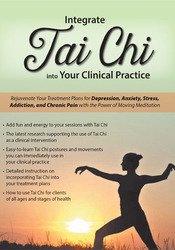
| File type | File name | Number of pages | |
|---|---|---|---|
| Manual (3.14 MB) | 29 Pages | Available after Purchase |

Dr. Elizabeth Nyang, EdD, MA, LCPC, is a licensed counselor and certified Tai Chi instructor who works with clients dealing with mood disorders, life issues, and addictions. She uses mindfulness and Tai Chi techniques to help them reduce stress and gain insight into their problems. Dr. Nyang also accepts clients in need of treatment for alcohol and drug addiction and works with them in a special program that includes group and individual counseling to help them build a plan to get in and stay in recovery. A longtime student of meditation, Dr. Nyang spent one year learning walking and sitting meditation at a Buddhist Temple. She earned her master’s degree in counseling from Seton Hall University and her doctorate degree in counseling education from the American School of Professional Psychology at Argosy University.
Speaker Disclosures:
Financial: Elizabeth Nyang is in private practice. She receives a speaking honorarium from PESI, Inc. She has no relevant financial relationships with ineligible organizations.
Non-financial: Elizabeth Nyang is a member of the American Counseling Association and the Maryland Counseling Association.
Access never expires for this product.
The Latest Research on Tai Chi as a Clinical Intervention
Make Tai Chi Postures Easy and Natural for Your Clients
Incorporate Tai Chi into Your Treatment Plans for Depression and Anxiety
Help Stressed Clients Cope with Meditative Movement
Addiction: Adapt Tai Chi to Help Control Addictive Cravings
Tai Chi for Chronic Pain
Satisfaction Guarantee
Your satisfaction is our goal and our guarantee. Concerns should be addressed to: PO Box 1000, Eau Claire, WI 54702-1000 or email info@pesi.com.au.
Please wait ...